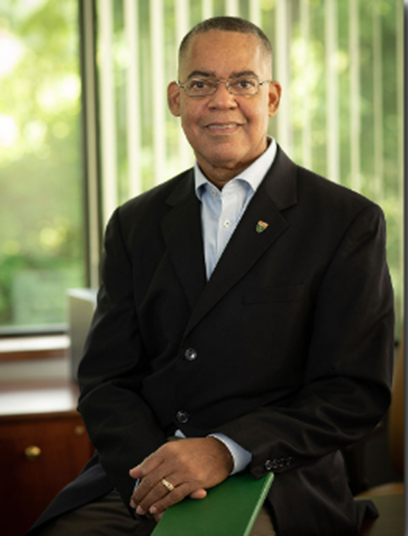August 20, 2024

Dr. Guy Fish started on the job at Codman last week.
Dr. Guy Fish brings extensive experience as CEO
Codman Square Health Center has a new Chief Executive Officer. Dr. Guy Fish, who most recently led the Greater Lawrence Family Health Center, assumed the leadership post last week. The 64-year-old physician succeeds Sandra Cotterell, who months ago announced her plan to retire from Codman’s top job after 13 years at the helm.
Originally from Cleveland, Ohio, Fish has been a leader in health care and private industry throughout his 40-year career. Fish told The Reporter today on Monday that he was drawn to the Codman job because of its mission as a “historically well recognized center for improving the health of community.”
“From the very onset, the goal was to build the best urban communities in America,” said Fish, who noted that the health center – with an annual operating budget of more than $55 million – has a mission that extends far beyond providing health services to its nearly 25,000 patients per year. It is also a principal driver of wellness in large parts of Boston’s neighborhoods, with partnerships with organizations like Codman Academy Charter School, the Daily Table, and Healthworks Community Fitness.
"We are thrilled to have someone with such deep leadership and medical experience – especially someone who has led another federally qualified community health center," said Bobby MacEachern, the chairman of the CSHC board. "The patients, staff, and community deserve a strong leader who will take us through the challenges we will face in the coming years and help us continue to provide excellent quality of care and we have one in Dr. Fish."
During his three years as the CEO at Greater Lawrence Family Health Center (GLFHC), Fish was credited with increasing revenues from $65 million to $100 million annually. The center operates nine clinical sites in and around Lawrence with more than 68,000 patients and 850 employees.
Lawrence was just the latest stop in a diverse career that began after he earned a degree in biochemistry from Harvard and then a medical degree from Yale. After a stint working in his native Ohio at Case Western Reserve, Fish and his wife operated an internal medicine practice in rural Delaware before turning to health management after he earned his graduate degree from Yale.
His subsequent career track has included CEO positions in several health-focused companies, including Cellanyx Diagnostics, which uses artificial intelligence to gauge cancer risks, and Next Stage Therapeutics, a Spanish company. He spent 17 years as an executive at the health care strategy consulting firm Fletcher Spaght, Inc., and also served as a senior consultant at the Boston Consulting Group.
Locally, he has served as a Trustee of the Beth Israel Deaconess Medical Center, which is affiliated with Dorchester’s Bowdoin Street Health Center. The board role at BI-Deaconess afforded Fish a formative window on the local web of community health centers (he served as a special advisor to the Bowdoin Street executive director) and influenced his leadership role in Lawrence and, now, Dorchester.
Earlier this year, as he contemplated the end of his contract at Lawrence, his network alerted him to the opportunity to fill Cotterell’s role at Codman. Fish says that he began to interview and consider the job about four months ago.
“It was super helpful being a member of the Mass League of Community Health Centers and being in communion with the other operators,” he said.
Dr. Fish arrives in Dorchester at a precarious moment as the state’s health care ecosystem prepares for what could be a cascade of potentially catastrophic closures — including that of Dorchester’s own Carney Hospital. As he settles into his new office on Washington Street, he’s cognizant that the now-imminent shuttering of the community hospital ten blocks away could thrust him and his new team into a crisis akin to the earliest days of the Covid pandemic.
“We are at the epicenter of the Carney closure,” Fish told The Reporter. “The data shows we are averaging probably 190 patients who end up in the Carney ED every month. With that closure, where are they going to go? We have to brace for impact.”
Fish said he’s consulting this week with other health center leaders and the state’s public health apparatus to appeal for more resources for Codman and other close-in facilities.
“It’s going to be an onslaught,” he said of the anticipated crush of new patients seeking urgent care and other needs previously met at Carney. “We’re already seeing a significant uptick. And some of that is with psychiatric care, because Carney has a large number of psychiatric care and beds.”
With his management and clinical experience, Fish will likely be a critical partner in figuring out how to triage the Carney crisis and figure out next steps.
“I’ve had lots of experience figuring things out on the fly,” he said.


